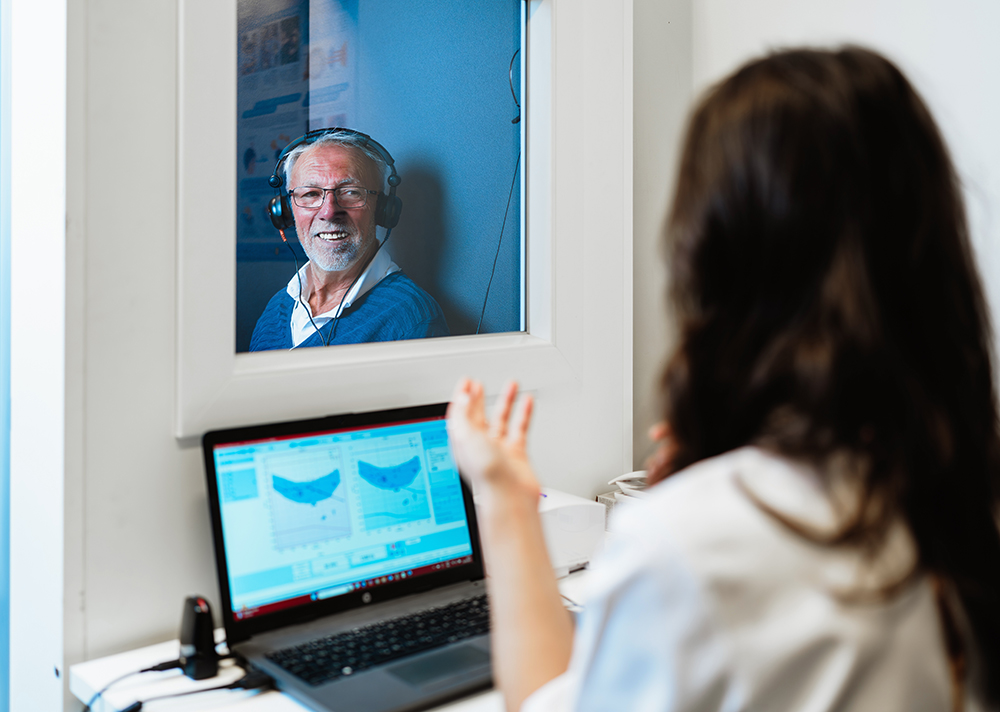The Role of Hearing Tests in Preventative Health Care
Hearing tests are an important part of preventative health care, yet many
New Location Now Open in Fort Mitchell! LEARN MORE →

By: Vanessa Ewert, Au.D, LIC.-A | November 18, 2025
Hearing tests are an important part of preventative health care, yet many people overlook them until they notice obvious problems with their hearing. Just as you schedule regular eye exams to monitor your vision and dental checkups to maintain your oral health, routine hearing tests help you track changes in your hearing over time and catch potential issues before they affect your daily life. In most instances, hearing loss develops gradually, and by the time you notice significant difficulties, communication challenges may already be impacting your relationships, work performance and social activities.
Beyond protecting your ability to hear clearly, regular hearing tests support your overall wellbeing in ways that extend throughout your life. Research shows connections between untreated hearing loss and increased risk of social isolation, mental fatigue and cognitive decline. Over time, this withdrawal can affect your mood, mental sharpness and quality of life. Staying on top of your hearing health through routine hearing testing helps you address concerns early and maintain the clear communication that keeps you connected to family, friends and the activities you enjoy.
Hearing tests are a key part of preventative health care because they can find changes in your hearing early on. Early testing gives you and your audiologist the information needed to make choices that support your overall health.
When hearing loss is found early, it is often easier to manage or slow down changes before they affect communication and safety. Untreated hearing loss has been linked to trouble following conversations, feeling left out in social situations and increased risks of falls or memory problems. Regular hearing checks help lower these risks by ensuring you receive the right support when you need it.
Hearing loss usually develops slowly, so changes may not be obvious at first. Many people begin to miss certain sounds or need others to repeat themselves more often.
You might first notice it is harder to hear in busy places like restaurants or family gatherings. Sometimes, family members or friends may mention that the TV is louder than usual.
Because these changes happen over time, regular hearing checks are important for catching hearing loss early. This allows you and the audiologist to understand your hearing health and make choices that fit your needs.
There are several signs that your hearing may be changing. You might have trouble following conversations, especially when there is background noise, or find yourself asking others to repeat what they said more often than before. Turning up the volume on the TV or radio higher than usual is another common sign that something might be different.
You may also notice that certain sounds, like doorbells, alarms or phone calls, are harder to hear or seem less sharp than they used to be. Sometimes, it’s the people around you who notice first and mention that you seem to miss parts of conversations. Even small changes like these can make daily communication more tiring and less enjoyable.
Untreated hearing loss can affect much more than how well you hear. It can place extra strain on your brain as you work harder to fill in missing sounds or follow conversations, which may lead to fatigue or difficulty concentrating. Over time, this added mental effort can impact memory and contribute to cognitive decline. Many studies have shown a link between untreated hearing loss and an increased risk of dementia, making it important to treat hearing changes early to support long-term brain health.
Hearing loss can also influence how you feel and interact with others. When communication becomes more difficult, some people begin to withdraw from social activities or avoid group settings where hearing is challenging. This can lead to feelings of frustration, isolation or even depression. Addressing hearing loss helps keep conversations enjoyable and relationships strong, allowing you to stay active and connected with family, friends and your community.
There are also practical safety concerns to consider. Everyday warning sounds like car horns, alarms or approaching footsteps may be harder to hear, increasing the risk of accidents. Even in familiar environments, missing these cues can affect your awareness and confidence in daily routines. Treating hearing loss not only improves how you communicate but also helps you stay alert and secure in your surroundings.
Your overall medical history can offer valuable insight into your hearing health. Past illnesses, medications and treatments may all influence how well you hear or how your ears respond to certain conditions. Sharing this information helps the specialist understand your health more completely and identify potential risk factors that might affect your hearing over time. When we know about your broader medical background, we can provide care that is better suited to your individual needs and make recommendations that support both your hearing and your overall wellness.
Certain health conditions can have a direct effect on hearing, such as diabetes, heart disease or issues that affect blood flow or nerve function. Even medications used to treat other concerns can sometimes impact how the ear processes sound. Regular hearing checks are an important part of maintaining overall health, especially if you manage ongoing medical conditions.
As you get older, the tiny hair cells in the inner ear can become damaged, making hearing loss more common with age. About one in three adults between ages 65 and 74 has some level of hearing loss. Habits like listening to loud music or not protecting your ears around noise can increase the risk even more.
During a hearing evaluation, several tests may be used to understand how well you hear and process sound. These tests provide a complete picture of your hearing health and help identify any changes early. Common tests include:
Hearing aids are the most common and effective treatment for many types of hearing loss. These devices amplify sounds, making speech and everyday noises easier to hear and understand. Modern hearing aids are highly advanced, offering features like background noise reduction, directional microphones and wireless connectivity to phones or other devices. This technology allows you to stay engaged in conversations, enjoy music and hear important sounds in your environment more clearly.
Hearing aids are also highly customizable, which means they can be tailored to your specific hearing needs and lifestyle. During a fitting, your audiologist adjusts the settings based on your hearing test results and the situations where you struggle most. You can choose different styles, from behind-the-ear models to smaller in-ear options, and your devices can be programmed for different environments like quiet rooms or busy restaurants. This personalization ensures your hearing aids work comfortably and effectively, helping you feel confident and connected throughout your day.
Catching changes in your hearing early can make a big difference in how effectively you manage them. When hearing loss is identified promptly, it’s easier to address before it affects communication, daily activities or overall quality of life. Early detection allows you to explore options like hearing aids or other interventions while your ears and brain are still adapting, which can lead to smoother adjustments and better long-term outcomes.
Identifying hearing changes sooner also helps prevent the frustration and fatigue that often comes from struggling to understand speech or missing important sounds. It gives your audiologist the chance to provide personalized recommendations based on your specific needs and lifestyle. Regular hearing checks mean you can track changes over time and take action at the right moment, giving you the best possible results and maintaining your connection to the people and activities that matter most.
Ignoring changes in hearing can lead to more serious problems over time. Communication with others may become more difficult, which can cause stress and misunderstandings in daily life.
Untreated hearing loss has also been linked to a higher risk of feeling lonely or left out, and it may affect memory and balance. These issues can make it harder to stay active and independent. Caring for your hearing health early on gives you the best chance to protect your overall well-being.
Protecting your ears from everyday noises is an important step in keeping your hearing healthy.
Here are some simple ways to lower your risk of hearing loss from loud sounds at home, work or during leisure activities:
Regular hearing tests give you a clear picture of your hearing health and allow you to take action before small changes turn into bigger challenges. They provide insight into how your ears are functioning and help you understand what steps might be needed to maintain or improve your hearing. Keeping up with these appointments helps you stay engaged in conversations, participate fully in work and social activities, and avoid the frustration that can come from missed sounds or misunderstood words.
If you want to make sure your hearing is on track, you can reach our Bardstown, Danville, Elizabethtown, Frankfort, Lexington, Mount Sterling, Nicholasville, Paris, Richmond or Somerset, KY offices at (859) 295-5729. Scheduling routine hearing tests gives you peace of mind and ensures that any changes in your hearing are addressed promptly.
Tags: speech tests, tympanometry

Hearing tests are an important part of preventative health care, yet many
By: Vanessa Ewert, Au.D, LIC.-A | November 18, 2025

Living with tinnitus means dealing with sounds that only you can hear,
By: Vanessa Ewert, Au.D, LIC.-A | October 3, 2025

When you’re getting your hearing tested, you might be surprised by
By: Vanessa Ewert, Au.D, LIC.-A | September 24, 2025
